Exploring views about international engagement, travel and closeness to others around the globe

This Pew Research Center analysis focuses on international travel experience and public opinion of international engagement and closeness to others around the world in 24 countries in North America, Europe, the Middle East, the Asia-Pacific region, sub-Saharan Africa and Latin America.
There are many ways people think about topics like international engagement and connectedness. In this survey, we asked respondents about three specific things related to these concepts: feelings of connection with people around the world, in your country, and your community; involvement in world affairs and cooperation with other countries; and international travel. Our questions on connection to various groups are based on the Identification With All Humanity Scale (McFarland et al., 2012). Wave Seven of the World Values Survey (fielded 2017 through 2022) includes a similar battery of questions related to closeness to different groups of people.
To examine how international travel is related to engagement and connectedness, we looked at differences in these attitudes between people with relatively high and low travel experience. See “Travel and international engagement” for more information on how these groups were created. And, for more about the relationship between travel and international attitudes in the U.S., read “Americans who have traveled internationally stand out in their views and knowledge of foreign affairs.”
For non-U.S. data, this report draws on nationally representative surveys of 27,285 adults conducted from Feb. 20 to May 22, 2023. All surveys were conducted over the phone with adults in Canada, France, Germany, Greece, Italy, Japan, the Netherlands, South Korea, Spain, Sweden and the United Kingdom. Surveys were conducted face to face in Hungary, Poland, India, Indonesia, Israel, Kenya, Nigeria, South Africa, Argentina, Brazil and Mexico. In Australia, we used a mixed-mode probability-based online panel.
In the United States, we surveyed 3,576 U.S. adults from March 20 to 26, 2023. Everyone who took part in this survey is a member of the Center’s American Trends Panel (ATP), an online survey panel that is recruited through national, random sampling of residential addresses. This way nearly all U.S. adults have a chance of selection. The survey is weighted to be representative of the U.S. adult population by gender, race, ethnicity, partisan affiliation, education and other categories. Read more about the ATP’s methodology.
Here are the questions used for the report, along with responses, and the survey methodology.
How close do people feel to others around the world? How much do they want their countries involved in international affairs? How do people’s experiences with travel and feelings of international connectedness relate to their views about the world?
These are among the questions we explored in a recent 24-nation survey. We found that while most respondents feel close to people in their countries and their local communities, they are more divided over how close they feel to others across the globe.
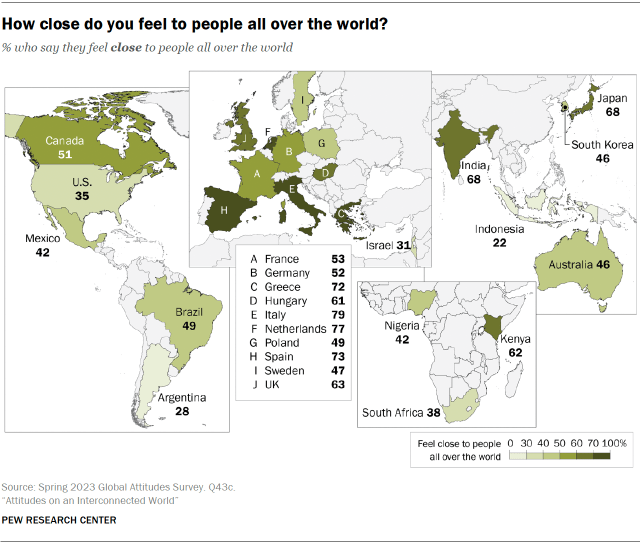
A median of 50% say they feel very or somewhat close to people all over the world, while 46% feel not too or not at all close. Feeling close to others around the world is more common in Europe than in other regions. Only 35% express this view in the United States, and it is even less common in Argentina, Indonesia and Israel.
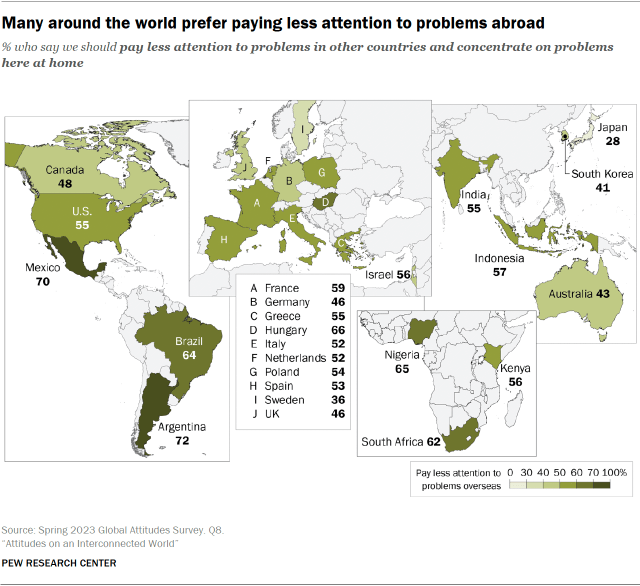
When it comes to engagement and cooperation with other nations, views differ significantly among the nations we polled, but a median of 55% want to pay less attention to problems in other countries and concentrate on problems at home; 43% think it’s best for the future of their country to be active in world affairs.
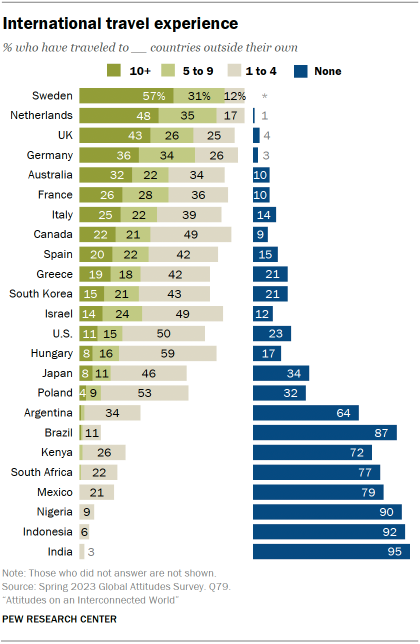
International travel experience also varies greatly across the nations in the study, and it is strongly correlated with per-capita gross domestic product. In the Netherlands, Sweden and the United Kingdom, more than four-in-ten have traveled to 10 or more countries. While about three-in-four Americans have traveled abroad, only 11% have been to 10 or more nations.
In middle-income nations in Africa, Latin America and Asia, majorities have never left their country. However, most of those who have not traveled internationally say they would if they had the opportunity.
Travel experience, feelings of connectedness to others around the world, and views about your country’s role in world affairs are often related to one another, our survey found. International travelers are more likely to report feeling close to people in other countries. And those who travel and feel close to others around the world tend to believe their countries should be involved in global politics.
For this report, we surveyed people in 24 countries on:
- Connectedness to community, country and the world
- Foreign policy and international engagement
- International travel
The survey was conducted from Feb. 20 to May 22, 2023, among 30,861 people in 24 countries.
Feeling connected to others
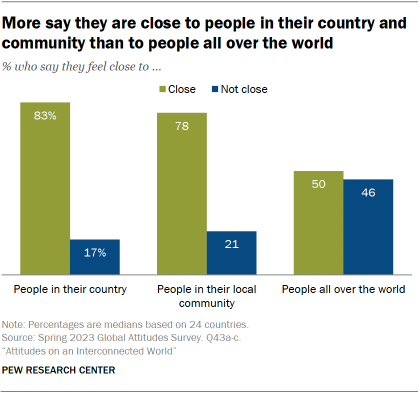
A median of 83% across 24 countries say they feel close to people in their country. Majorities in every nation surveyed expressed this view, although the U.S. has one of the smallest shares who feel close to others in their country – 66% say this, and only 15% say they feel very close to other Americans (also the lowest share of any nation in the study).
A median of 78% feel close to people in their local community, while 21% do not. At least half in every country feel close to those in their local community. South Koreans (50%), Americans (54%), Argentines (57%) and Germans (57%) are the least likely to hold this view.
Views of global interconnectedness are mixed: A median of 50% say they feel close to people all over the world, while 46% do not feel close to the global community. While most in Europe feel close to people all over the world, this view is less common in other regions surveyed. Roughly half or more feel this way in each of the 10 European nations polled, but Canada, India, Japan and Kenya are the only other countries where at least half share this view. About a third or fewer in Argentina, Indonesia, Israel and the U.S. feel close to others around the world.
For more on how close people feel to others around the world, in their country and in their community, read Chapter 1 of this report.
International engagement
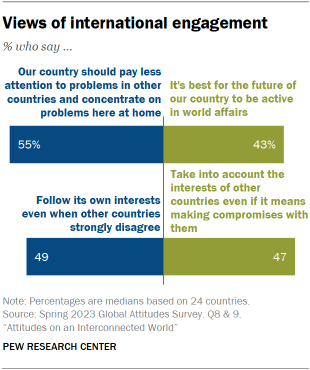
Respondents were asked to choose between the following two viewpoints: “Our country should pay less attention to problems in other countries and concentrate on problems here at home” or “It’s best for the future of our country to be active in world affairs.” The prevailing view in most nations surveyed is that their country needs to concentrate on problems at home: A median of 55% across 24 countries express this view. Publics in Africa and Latin America are especially likely to express this opinion. But in six nations, at least half say it’s best to be active in world affairs: Australia, Germany, Japan, South Korea, Sweden and the UK.
The share of Americans who believe the U.S. should be active in world affairs has declined in recent years. Just 43% hold this view today, compared with 53% in September 2019.
Respondents were also asked whether their country should follow its own interests even when other countries strongly disagree, or take into account other countries’ interests even if that means making compromises. Overall, publics are roughly divided: A median of 49% say their country should follow its own interests, while 47% say they should consider the interests of others. The African and Latin American nations in the study are particularly likely to favor pursuing their own interests compared with other regions.
For more detail on views about international engagement, see Chapter 2 of this report.
International travel
European nations report especially high levels of international travel. (These nations have relatively high incomes, a relatively large number of neighboring countries and a right to free movement within the European Union.) Australians and Canadians are also more likely than others to have traveled to at least one country outside their own.
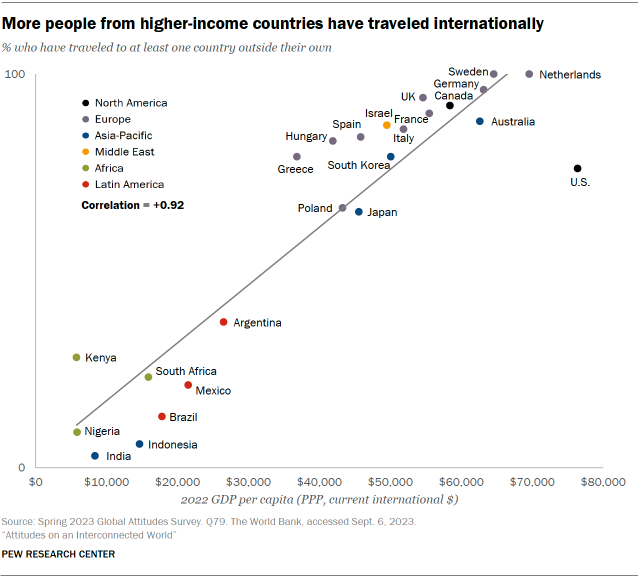
A country’s gross domestic product per capita is strongly linked to the share of the public who have traveled abroad. But while the U.S. has the highest GDP per capita of any country surveyed, several other nations have higher levels of international travel.
International travel is also linked to attitudes about international connectedness. Those who have traveled abroad are more likely to feel connected to others around the world, believe their country should be active in global affairs, and think their country should consider the interests of other nations even if it means making compromises.
For more on views about international engagement, see Chapter 3 of this report.
Ideology and interconnectedness
In many nations, people on the ideological left are particularly inclined to say their country should be active in world affairs. Those on the left also tend to believe their country should consider the interests of other nations even if it means making compromises.
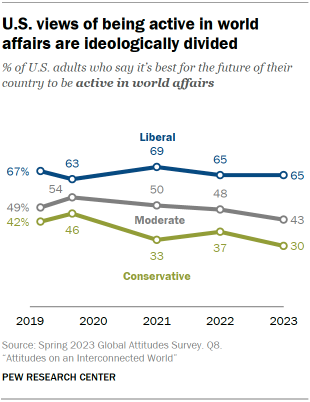
This ideological gap is largest in the United States, where it has increased substantially over the past few years. Since 2019, about two-thirds of American liberals have consistently said they favor taking an active role in world affairs. But the share of conservatives who hold this view has declined significantly, and it has also declined among those who describe themselves as moderates.
Ideology is also linked to how close people feel to others across the globe and in their countries. In several nations, respondents on the left are especially likely to feel close to others around the world. The opposite is true for closeness to people in your own country – in several countries, this view is more common on the ideological right.


